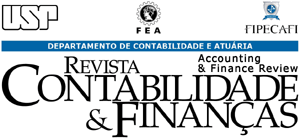Resumo em Português:
Esta pesquisa teve como objetivo analisar as características dos Periódicos Brasileiros de Contabilidade. O levantamento das características dessas publicações revelou que a observação das normas, internacionalmente reconhecidas, para a apresentação de periódicos, de fascículos e de artigos, ainda é incipiente. Do levantamento das características dos artigos publicados, no período de 1990 a 1999, em cinco periódicos nacionais de Contabilidade intencionalmente selecionados, observou-se que a maioria dos autores são docentes, evidenciando que ainda é nas universidades que se origina a maioria das pesquisas contábeis, reflexo da carência de centros de pesquisa contábil, dos mecanismos de incentivo à pesquisa e da pressão pela divulgação delas nas Instituições de Ensino Superior. Considerou-se que, como os autores com pós-graduação são a maioria, isso reforça a importância desses veículos de comunicação e de seu conteúdo para a comunidade científica nacional. As cinco áreas temáticas privilegiadas com maior percentual de trabalhos são, sucessivamente, Contabilidade Gerencial, Contabilidade Financeira, Teoria da Contabilidade, Educação e Pesquisa Contábil e Contabilidade de Custos. Os temas mais abordados nos periódicos evidenciam uma mudança no paradigma contábil, realçando a importância da Contabilidade Gerencial e das pesquisas sobre esse tema, bem como o interesse dos pesquisadores sobre os assuntos a ele relacionados. Entretanto percebeu-se que temas atuais e importantes, como Contabilidade Internacional, Contabilidade e Mercado de Capitais e Contabilidade Social e Ambiental, ainda carecem de pesquisas. Em suma, produzir artigos e periódicos de melhor qualidade constitui um desafio para os cientistas contábeis brasileiros neste milênio.
Resumo em Inglês:
The objective of this research was to analyze the characteristics of Brazilian accounting periodicals and the articles published in them. Our analysis revealed that, in the Brazilian accounting periodicals, the observation of internationally recognized standards for the presentation of periodicals, quires and articles is still in its initial stage.The survey of the articles published between 1990 and 1999 in five Brazilian accounting periodicals that were selected on purpose revealed that most of the authors are lecturers, which demonstrates that the universities still originate most of the accounting research. The fact that most of the authors have a post-graduate degree was considered a strengthening factor of the importance of these communication vehicles and their contents for the national scientific community.The five thematic areas with the highest number of works are, successively, Management Accounting, Financial Accounting, Accounting Theory, Accounting Education and Research and Cost Accounting. The main themes dealt with in the periodicals demonstrate a change in the accounting paradigm, emphasizing the importance of Management Accounting and research on this theme, as well as the researchers' interest in subjects related to it. However, it was perceived that there is still a lack of research in current and important themes such as International Accounting, Capital Market Accounting and Social and Environmental Accounting. In summary, the production of higher-quality accounting research and periodicals constitutes a challenge to Brazilian accounting scientists for this millennium.
